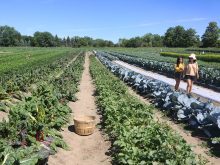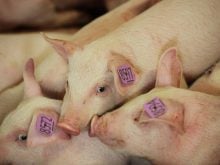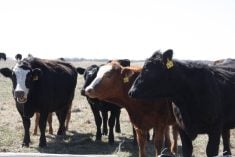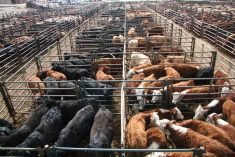The United States’ country-of-origin labelling law needs a rewrite, says an international group that met in Calgary last week.
The Pacific Northwest Economic Region is sending a letter to the United States Congress outlining the economic impacts the bill could have on the area.
The group prefers voluntary labelling because of intense trade within the region for beef, pork, fish, fruit and vegetables. At the least, the group suggests products should be labelled by country of origin at the point of processing, rather than listing all nations that provide raw ingredients.
Read Also

VIDEO: Ag in Motion documentary launches second season
The second season of the the Western Producer’s documentary series about Ag in Motion launched Oct. 8.
Last year $170 million worth of livestock from Alberta and British Columbia went to Washington state for slaughter.
“Obviously it will have a very big impact on Albertans,” said Peter Kuperis, trade policy analyst with Alberta Agriculture.
The issue remains controversial in the U.S. Most recently the chair of the House of Representatives agriculture subcommittee for appropriations delayed the legislation by refusing funds for its implementation by 2004.
The senate has not prepared its budget and if it approves funding, the issue must be negotiated between the two levels of government, said Eric Davis, president of the National Cattlemen’s Beef Association.
He said some form of country-of-origin labelling is inevitable.
“The question is not whether you are for it or agin it, as much as how you do it,” he said.
Kuperis argues that country labelling does not further the public’s right to know about meat origin.
Previous consumer studies indicate people are willing to pay extra for organic foods or milk that does not contain the production enhancing bovine somatotropin. However, retail sales do not indicate a change in buying patterns, because people still select items according to price.
“These surveys don’t have a great track record,” said Kuperis.
No one knows if American consumers will pay a premium for beef labelled “product of U.S.A.” since most retail meat is American product.
Major grocery chains have decided to act and informed American meat packers they will not accept responsibility for labelling violations if suppliers fail to provide correct information demanded under the law.
Safeway, Albertson’s and other major retail stores sent letters to American meat suppliers saying they will seek compensation for damage or losses sustained, said Rick Stott of Agri Beef Inc. based in Boise, Idaho.
The company owns 16 feedlots with more than 170,000 head capacity. Its meat is directed into several specialty branded beef programs for retail and food service outlets. The company also buys Canadian cattle and from packers that slaughter Canadian animals.
“We cross the border. We buy fat cattle from Alberta and Washington beef,” he said.
Stott’s company is already determining how to meet requirements with more intensive traceback programs using electronic identification.
Agri Beef Inc. can trace cattle back to individual ranches and feedlots but these do not know where the cattle were born.
“What we can’t do specifically is tap the detailed records,” he said.
The controversial country-of-origin labelling law would include fines of up to $10,000 per violation. All suppliers, including the primary producer, would have to keep records to prove their animals were born, raised and slaughtered in the U.S. For many, such records do not yet exist.
“It could cost you hundreds of thousands of dollars if your system breaks down,” Stott said.
Another area of concern is delegation of inspection authority to the states.
“Some states have really good enforcement and some have almost nothing at all,” he said. That forces retailers to use the highest level of enforcement to provide consistency across the nation.
“That’s what is going to drive the cost of this thing. It’s how the retailers decide to mitigate their risk,” Stott said.

















